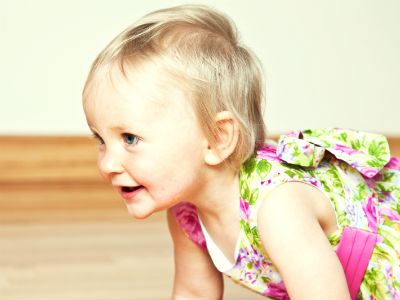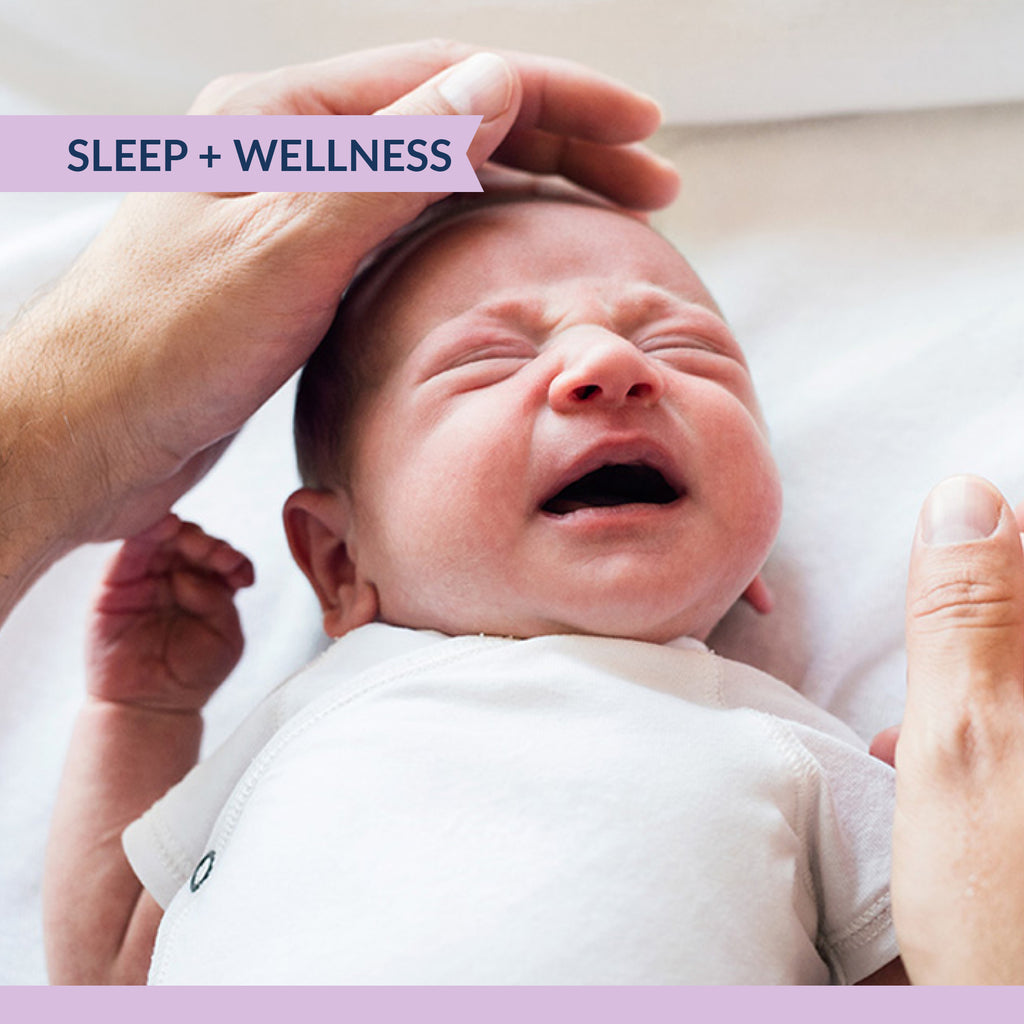
7 Reasons why babies cry in their sleep And 5 Best Sleep Solutions– Nested Bean
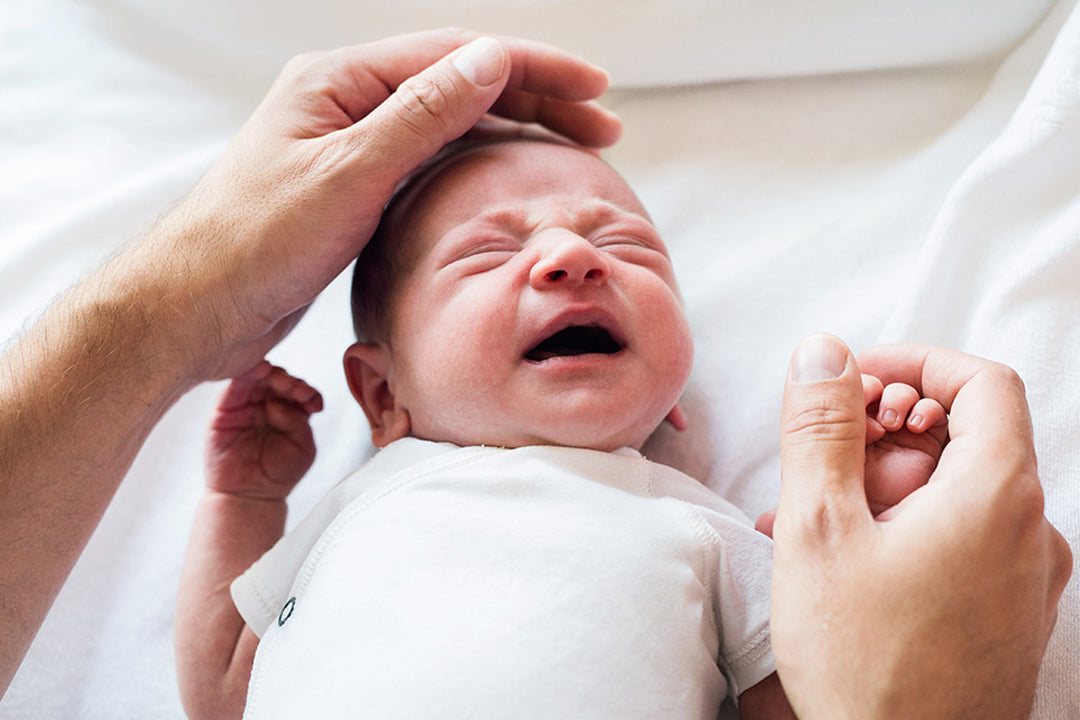
When you’re a new parent, your number one wish is for your baby to sleep through the night – but what do you do when they’re crying in their sleep? Not only can this be alarming for family members, but starting to cry in the middle of sleep can wake up your little one in the middle of their rest.
Don’t worry, though, as most of the time your baby will be crying for a reason that isn’t serious, and that you’ll be able to solve in a few easy steps.
7 Reasons Babies Cry In Their Sleep
How to soothe a baby crying in their sleep
Baby cries in sleep: three key takeaways
7 Reasons why babies cry in their sleep
Though it may be stressful and feel serious in the moment, babies cry in their sleep for a wide range of reasons that typically aren’t anything to be worried about. From standard sleep behavior to typical teething pains, there are plenty of factors that can cause your baby to cry during sleep or wake themselves up crying – and lots of ways to calm them down too!
Normal newborn development
When your baby is only a few weeks old, it’s considered normal for them to cry a little during sleep as they adjust to their new sleep patterns. This is because newborns go back and forth between non-rapid eye movement and rapid eye movement (or REM sleep).
When they’re in the latter phase, it means that they’re dreaming, and that can often come with some noises and maybe a few tears. However, it’s nothing to be concerned about, and is similar to an adult talking a little in their sleep – a little strange, but nothing dangerous!
Overtiredness
As a parent you want nothing more than for your newborn baby to sleep – so it can be especially frustrating when they get so tired that they struggle to doze off!
When a baby begins crying in their sleep, caregivers may worry that something is wrong. However, in most cases, for babies, crying while asleep is a phase rather than a sign of a serious problem. – Medical News Today
This happens because fatigue can actually cause a stress response in your baby, leading to chemicals like adrenaline and cortisol being released and keeping them alert and stressed when they should be relaxing. This can result in crankiness, sudden movement, a high-pitched cry, and sometimes crying a little after they’ve started falling asleep.
Transitioning between sleep cycles
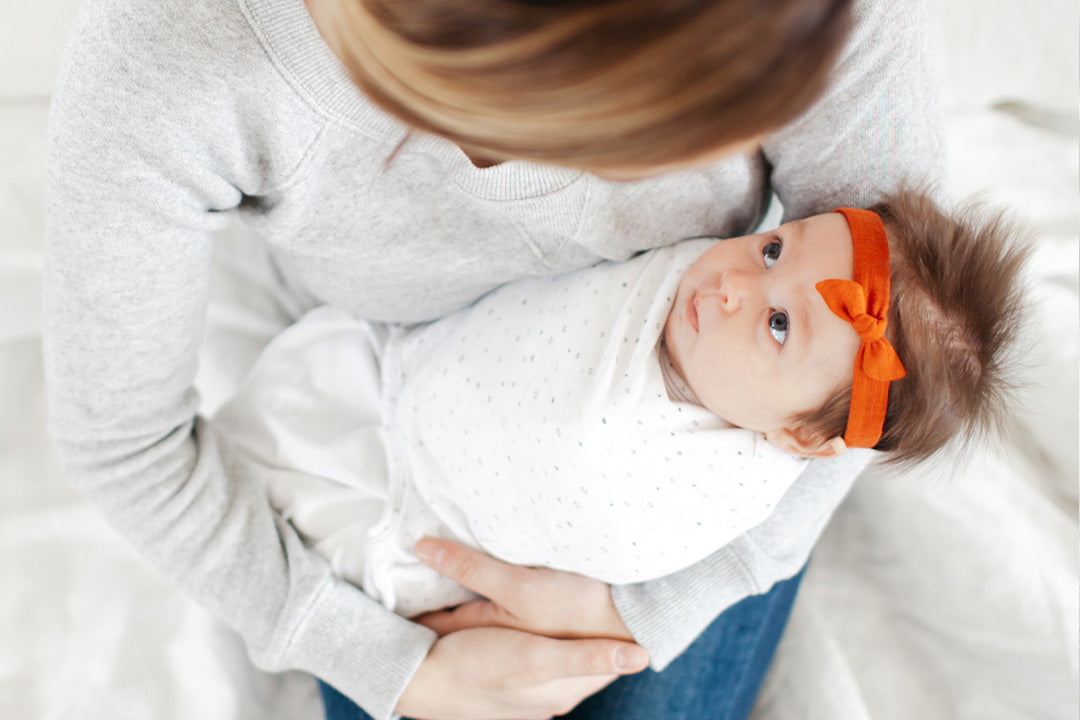
When your baby is a newborn, they only have two different stages of sleep, NREM (nonrapid eye movement) and REM (rapid eye movement), with these stages being split 50/50 across a single stretch of sleep.
However, when your baby gets to be a few months older, they’ll start experiencing two additional NREM stages as adults do, These stages tend to be lighter, and this means that as your baby adjusts to this, their sleep is more easily disrupted by wakeups and nighttime crying.
Nightmare and Night terrors
Most of us get nightmares from time to time, and your baby is no different – but experiencing them for the very first time can make them much scarier! Bad dreams can start occurring from when your little one is around a year old, as this is when they start to develop more fears and anxieties about the world around them.
Worse still are night terrors, which can take effect from around 24 months or so; your child will remain asleep for these, but they can still result in crying and sudden, frightened movements.
Teething pain
All of us have gone through teething, but as adults, it’s hard to remember just how much discomfort it can cause, especially when we were trying to get to sleep. Baby teeth usually start coming in at between 6 and 12 months old, leading to symptoms like red, swollen gums, a slight fever, a hot cheek, and sometimes crying at night.
Sleep regressions
A sleep regression is a period of disrupted sleep that comes after a stretch of time where your baby is sleeping consistently during naps and through the night.
The main signs are fighting sleep, sleeping for less time at night, and waking up more frequently through the night – often accompanied by crying. Usually, these regressions hit at particular ages like 4 months, 6 months, and 8 months, as this is when your baby will hit certain developmental milestones.
Sleep training
If you’ve started to sleep train your baby, you’ll know that it isn’t always easy, and one of the main reasons why is that your baby wakes up crying in the night.
This may vary depending on the method you’re using – for example, with methods like the Ferber Method and Cry It Out, you may experience more periods early on where your baby wakes up upset in the night wanting your attention.
How to soothe a baby crying in their sleep
Having a baby who cries in their sleep frequently can be exhausting, and take a toll on your own wellbeing if you’re sleep deprived every morning. But don’t worry – there are some simple solutions to almost all of these problems that will hopefully have your little one sleeping soundly through the night again in no time.
A consistent schedule
Having a consistent schedule is vital when you’re facing any kind of sleep problem with your baby, and this schedule should be based on your baby’s own behaviors and habits.
For example, if your baby is crying at night because of overtiredness, you should make sure that they aren’t staying awake for too long between periods of sleep (newborns can usually only stay awake comfortably for around 90 minutes).
A calming routine
When your little one is having a nightmare or night terror, you might be tempted to wake them up, but this may actually cause them more distress and lose you both more sleep. Instead, you should let them snooze – but that doesn’t mean you can’t take a preventative approach.
Because these nightmares are often caused by stress, you can try to soothe your baby before bed with a routine that includes a cuddle and a gentle bedtime story.
Nested Bean swaddle
If your little one is crying at night and hasn’t started to roll over independently yet, swaddling could be the perfect solution. Our Zen Swaddle is gently weighted to mimic your soothing touch, and is perfect for helping a stressed-out baby feel safe and secure at night.
Sleep sack
If your baby is a little too old to be swaddled – this is when they’ve started to roll over by themselves – a sleep sack is a great solution. The Zen Sack with its weighted pad can provide some of the comforting pressure of swaddling in a way that’s safe for older babies, making them feel more snug and safe as they go to sleep independently at night.
Soothing environment
Overstimulation can cause stress and nighttime crying in babies, and waking up from a nightmare in a space that they find stressful can make your little one even more upset. You can combat this by keeping your baby’s sleep space free of too much noise – a baby-safe white noise machine can be great for this – and use blackout curtains to block out outside light.
Alternatively, if your child is scared of the dark, a small nightlight might make them feel more comfortable as they fall asleep.
Baby cries in sleep: Key takeaways
Infant sleep problems like crying through the night are one of the toughest parts of being a new parent, but it’s important to remember that these issues are almost always temporary. If you keep finding yourself having to soothe a crying baby in the middle of the night, there’s often a simple reason why, and an equally straightforward solution. Here are the key things to keep in mind when you’re handling a baby crying at night:
Soft crying at night during newborn sleep is often just a sign of healthy REM sleep patterns
Milestones like teething can often lead to sleep regressions and nighttime crying
Nightmares can start as early as 12 months with night terrors coming a little later
Waking a baby will likely upset them more, so take a preventative approach
A soothing bedtime routine and space can help your baby sleep
Swaddling with the Zen Swaddle is perfect for young babies who struggle with nighttime wakeups
The Zen Sack is great for older babies who need a little more comfort at nighttime
Other Resources
National Library of Medicine: Night Waking
National Library of Medicine: Infants Can Resettle Themselves Back to Sleep
American Academy of Pediatrics: Behavioral Interventions for Infant Sleep Problems
Commonly asked questions about babies crying in their sleep
Why does my baby cry during deep sleep?
There are several reasons that your baby might be crying while they’re fast asleep at night, and their age is the most important factor when it comes to figuring this out. Newborn babies may cry during REM sleep as they get used to their new routine outside of the womb, while babies who are a few months old and transitioning to more adult sleep patterns may cry when they enter lighter stages of sleep.
At around a year old, it’s possible that your child will start having nightmares during active sleep, which can lead to them crying or showing other signs of distress in the night.
How do a soothe a crying baby at night?
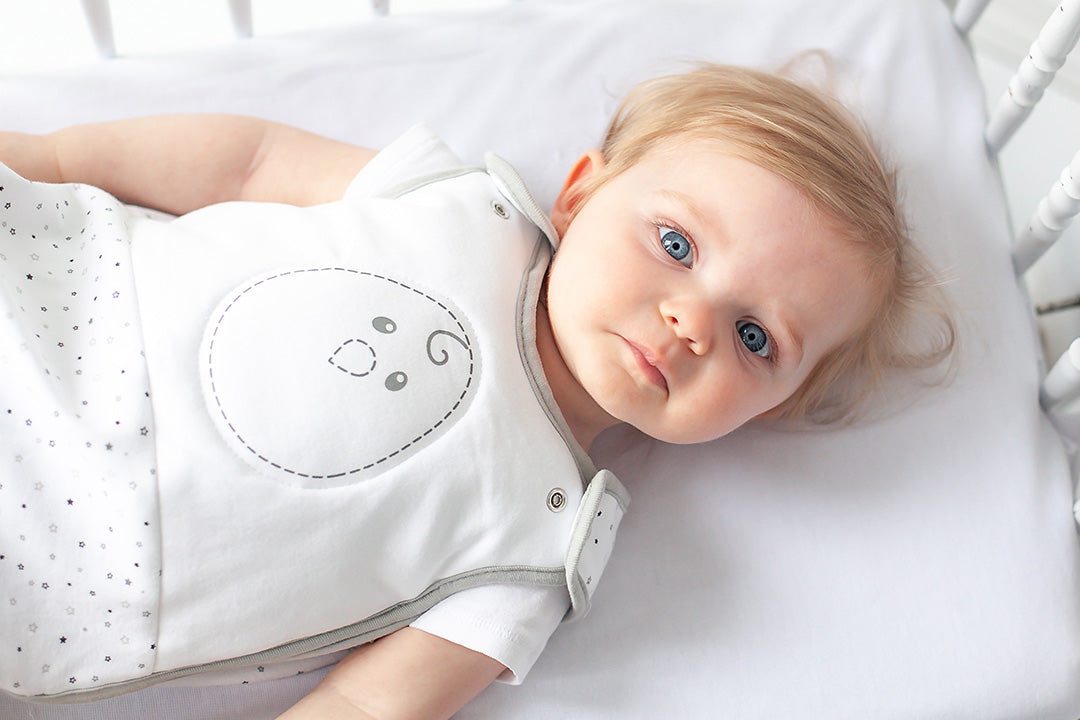
There are a range of techniques and sleep aids that you can try out if you’re wanting to help soothe a baby who has been crying at night. Making their sleep space quiet and dark can reduce stress from overstimulation, though a nightlight might be preferred for little ones who are scared of the dark. You can also try swaddling with our Zen Swaddle – this is a great way of helping your baby settle and learn to self-soothe.
When it comes to nightmares and night terrors, you’ll generally not want to wake up your little one, as this can lead to more confusion and distress. However, preventative techniques during waking periods like a soothing bedtime routine can help them be more likely to get a good night’s sleep.
How much do most babies sleep in a day?
The amount that your baby sleeps in a day depends on their age, and so does the way this sleep is divided up. For example, while a newborn baby will need up to 18 hours of sleep per day spread across a nighttime sleep and at least 3 to 4 naps, a 4-month-old baby will only need around 14 hours of sleep with 2 to 3 naps in a 24-hour span.
If your baby waking up in the night from crying is disrupting their normal sleep schedule, don’t worry too much – the important thing is that they get the amount of sleep they need, not necessarily when they get that sleep in the day.
Why is my baby waking up from light sleep and crying?
If your baby is waking easily in the night from light sleep and getting upset, there could be a few different reasons behind it. Developmental milestones like teething can often prevent your baby from properly falling asleep due to discomfort, which may lead them to cry out of frustration or even become overtired and stress themselves out further.
The issue may also lie with the space that your baby sleeps in – bright light coming in through windows and noise coming from outside or inside your home could be waking your baby up before they’ve had a chance to reach REM sleep, resulting in crying.
May 21, 2022
Athena S.
